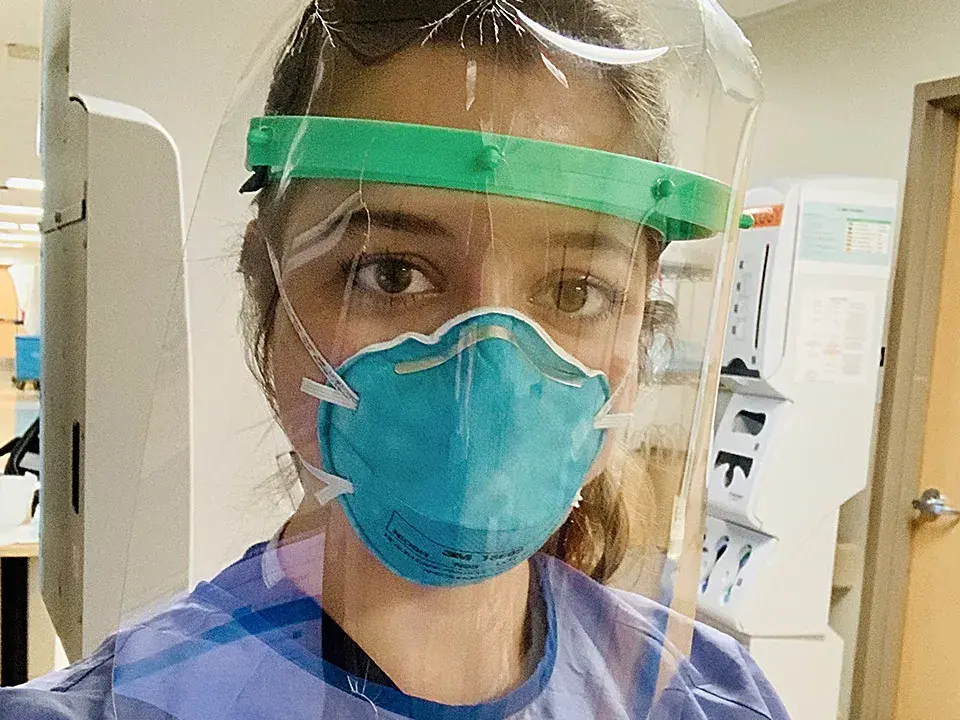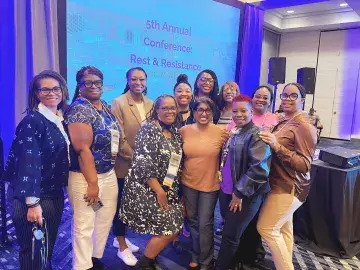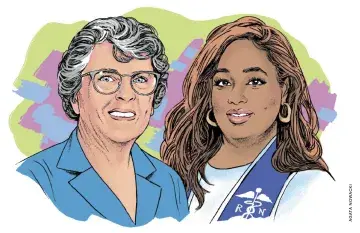Fighting on the Frontlines of the COVID-19 Crisis

Hannah Miller, ABSN ’18, is an orthopedic nurse at San Jose’s Good Samaritan Hospital—someone who values consistency and order. Then COVID-19 hit the Bay Area, bringing with it chaos and changing everything about the way she did her job.
Miller, an Accelerated Bachelor of Science in Nursing program graduate, was thrust onto the frontlines when the orthopedic floor was closed and she was floated to another unit that had been converted to care for novel coronavirus patients. The experience, while full of uncertainty, was a tremendous learning opportunity, and she’s proud to have been a first responder during the pandemic.
How did Good Samaritan prepare for COVID-19?
In the beginning of the year, we were definitely aware of COVID, but it hadn’t hit the Bay Area yet. In early March, Good Sam shut down the orthopedic unit (my home unit) and converted the oncology unit into a COVID unit. All elective surgeries were canceled, so there went my whole patient population. I was an ortho nurse who was suddenly a respiratory nurse.
The nurses huddled every day and learned from the previous shift. We had to don and doff PPE (personal protective equipment). We also had to conserve PPE. Good Sam found a way get the N95 masks decontaminated and reuse them, so we never ran out. We’re not wasting them now because there might be a second wave.
What was it like working with COVID-19 patients on a daily basis?
With respiratory patients, it’s a lot about managing their oxygen needs and respiratory distress. If they had a lot of coughing or breathing problems or secretions, we had to find the right medications and ensure they had enough oxygen to keep their oxygen stats above a certain level. We found that patients who had COVID, if they deteriorated, deteriorated rapidly. They went from talking normally to being moved to the ICU. Ortho patients don’t usually crash like that.
Also, being on an isolation floor, the patients didn’t see anyone except the doctor for a few minutes a day and the nurse. They were very lonely. Just taking the extra time to give them the human contact they craved was a big part of my job.
Did Good Samaritan experience a nurse and physician shortage like hospitals elsewhere?
When we were so busy, I was working a lot. But by April, there just weren’t that many patients in the hospital. People feared COVID and weren’t coming in. The hospital census dropped. Lower-seniority nurses, like me, got dropped from the schedule. Good Sam instituted pandemic pay. For every hour dropped, we get 70 percent of our pay, and I am so grateful.
How will you remember this experience?
I’m a person who doesn’t like change. That’s why I like the consistency of ortho. But then I found that everyone was adjusting, the whole world was adjusting. COVID has been a tremendous learning opportunity, learning how to adapt, working with different people in different environments. I surprised myself about how much I learned. This is a historic time, it’s the year of the nurse. Nurses have never been more appreciated. Before COVID hit, people didn’t really understand what nurses do and why they are so important. I’ll be able to tell my grandchildren about being on the frontlines someday, and I’m very proud of that.


